The Editor,
Re. "30 bears destroyed in Tri-Cities for conflict" (The Tri-City News, Dec. 19)
How can it be said people are more valuable than bears? Really? By whose reckoning?
We all share this planet and require clean air, water and food to survive. Bears are a part of the unique natural ecosystem that existed here for thousands of years before any human settlements were created. They were adapted to feeding on seasonal foods across wide home territories, moving with the food supply seasonally.
Wild creatures go where suitable food is available, whether it is grass, small rodents, fruits, fish… or garbage. If natural foods are not available, wildlife will turn to our garbage, which is all too easy to locate.
All creatures in an ecosystem have their specific niche to keep it functioning effectively. Can we give bears a fair chance to carry on their lives without harassment and death?
In areas known to have high wildlife populations, strategic plans need to be created to minimize conflicts and increase green undeveloped spaces. Such spaces benefit humans too, as is being noticed in many other parts of the world. Teachers are now being encouraged to take children into nature, but nature is becoming harder and harder to find.
Wildlife does have value. Wild creatures keep down rodents, clean up dead fish and fallen fruit, feed on bothersome insects and act as pollinators, to name a few. They do not pollute the environment. In many places, tourism centres around the presence of wild animals.
Over the last 150 years, humans have majorly affected ecosystems. Rapid development has given no thought to the wildlife that were the original inhabitants. Hillsides are stripped of vegetation, which held the soil, and replaced it with retaining walls. Roads, building sites, parking lots and backyards eliminate feeding areas. Runoff clogs the creeks, trees are clearcut, stream setbacks are minimal and there are few adequate green corridors left to allow for safe wildlife passage that are not also shared by humans, bicycles and domestic dogs.
If you decide to live in an area rich in wildlife, educate yourself to cohabit with what is there. Don’t expect that resident creatures must move out or be killed. Nature does not leave empty spaces to be filled with relocated wildlife .
Think about the wonder and beauty of these animals, encourage municipal governments to plan more wisely in wildlife rich areas, learn about their habits and don’t encourage them with garbage or handouts — they do better on their own.
Please, give bears their space. A healthy environment benefits everything that lives in it, wildlife and people.
Elizabeth Thunstrom, Coquitlam



